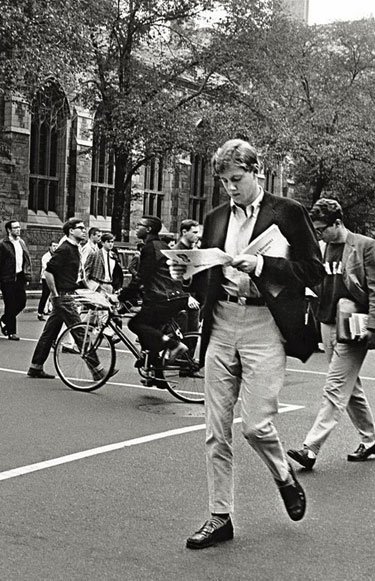Category Archive 'The Meritocratic Elite'
11 Aug 2018


Reihan Salam is of Bangladeshi extraction and went to Harvard, so he is in a position to explain precisely where Sarah Jeong’s animosity toward white men is coming from.
In some instances, white-bashing can actually serve as a means of ascent, especially for Asian Americans. Embracing the culture of upper-white self-flagellation can spur avowedly enlightened whites to eagerly cheer on their Asian American comrades who show (abstract, faceless, numberless) lower-white people what for. And, simultaneously, it allows Asian Americans who use the discourse to position themselves as ethnic outsiders, including those who are comfortably enmeshed in elite circles.
Think about what it takes to claw your way into America’s elite strata. Unless you were born into the upper-middle class, your surest route is to pursue an elite education. To do that, it pays to be exquisitely sensitive to the beliefs and prejudices of the people who hold the power to grant you access to the social and cultural capital you badly want. By setting the standards for what counts as praiseworthy, elite universities have a powerful effect on youthful go-getters. Their admissions decisions represent powerful “nudges†towards certain attitudes, beliefs, and behaviors, and I’ve known many first- and second-generation kids—I was one of them—who intuit this early on.
Consider the recent contretemps over Harvard’s undergraduate admissions policies. Critics argue that the university actively discriminates against high-achieving Asian American applicants by claiming that a disproportionately large number of them have lackluster personalities. One obvious reaction to this charge is to denounce Harvard for its supposed double standards. This reaction might be especially appealing to those who see themselves as the sort of people who’d be dismissed by Harvard’s suspect screening process, and who’d thus have every reason to resent it. Viewed through an elite-eye lens, though, this sort of reaction can seem a little gauche. You’re saying, in a sense, that you can’t hack it—you just can’t crack the code. To a successful code-cracker, that could seem more than a little pathetic.
So what if you’re an Asian American who has already made the cut? In that case, you might celebrate Harvard’s wisdom in judiciously balancing its student body, or warn that Harvard’s critics have a darker, more ominous agenda that can’t be trusted. This establishes you as an insider, who gets that Harvard is doing the right thing, while allowing you to distance yourself from less-enlightened, and less-elite, people of Asian origin: You’re all being duped by evil lower-whites who don’t grok racial justice.
And if you’re an Asian American aspiring to make the cut, even with the deck stacked against you, you might eschew complaining in favor of doing everything in your power to cultivate the personal qualities Harvard wants most, or at least to appear to have done so. One straightforward way to demonstrate that you are Harvard material might be to denounce Harvard as racist, provided you’re careful to do so in a way that flatters rather than offends those who run the university and are invested in its continued success. For example, you might reject the notion that affirmative action is the problem while arguing that Harvard shouldn’t endeavor to increase representation of rural and working-class whites, on the spurious grounds that all whites are privileged. That you’ll make these claims even though you yourself are hardly among the most downtrodden is immaterial: The important thing is to be interesting. What better way to demonstrate that you’re not a humdrum worker bee, afflicted with a lackluster personality, than to carefully and selectively express the right kind of righteous indignation?
I certainly don’t mean to single out Harvard. As the senior assistant director of admissions at Yale recently observed, “for those students who come to Yale, we expect them to be versed in issues of social justice. We encourage them to be vocal when they see an opportunity for change in our institution and in the world.†Picture yourself as an eager high schooler reading these words, and then jotting down notes. You absorb, assuming you hadn’t already, what it takes to make your way in contemporary elite America. And as you grow older, you lean into the rhetorical gambits that served you so well in the past. You might even build a worldview out of them.
RTWT
29 May 2018


Today’s older meritocrats at college in the late 1960s.
David Brooks is dead wrong on the character of the ancien regime, falling like a sap for the fantasy stereotypes of the left-wing imagination. There were always plenty of ordinary middle class guys not rich at all, and even some poor, working-their-way-through-college fellows at Yale from humble backgrounds, long before the pedophile from Horace Mann took over Yale admissions, probably really back to the Class of 1705. But he is otherwise basically right this time. And the older Ivy League graduate would conspicuously differ from today’s “meritocrat” in, despite some higher education, recognizing that he, too, just like the working class chap living on the other side of town, still puts his trousers on one leg at a time, and in remaining aware that his automobile mechanic and his hunting guide are just as human as himself and may even be, in some departments, better men.
The older establishment won World War II and built the American Century. We, on the other hand, led to Donald Trump. The chief accomplishment of the current educated elite is that it has produced a bipartisan revolt against itself. …
The real problem with the modern meritocracy can be found in the ideology of meritocracy itself. Meritocracy is a system built on the maximization of individual talent, and that system unwittingly encourages several ruinous beliefs:
Exaggerated faith in intelligence. Today’s educated establishment is still basically selected on the basis of I.Q. High I.Q. correlates with career success but is not the crucial quality required for civic leadership. Many of the great failures of the last 50 years, from Vietnam to Watergate to the financial crisis, were caused by extremely intelligent people who didn’t care about the civic consequences of their actions.
Misplaced faith in autonomy. The meritocracy is based on the metaphor that life is a journey. On graduation days, members for the educated class give their young Dr. Seuss’ “Oh, the Places You’ll Go!†which shows a main character, “you,†who goes on a solitary, unencumbered journey through life toward success. If you build a society upon this metaphor you will wind up with a society high in narcissism and low in social connection. Life is not really an individual journey. Life is more like settling a sequence of villages. You help build a community at home, at work, in your town and then you go off and settle more villages.
Misplaced notion of the self. Instead of seeing the self as the seat of the soul, the meritocracy sees the self as a vessel of human capital, a series of talents to be cultivated and accomplishments to be celebrated. If you base a society on a conception of self that is about achievement, not character, you will wind up with a society that is demoralized; that puts little emphasis on the sorts of moral systems that create harmony within people, harmony between people and harmony between people and their ultimate purpose.
Inability to think institutionally. Previous elites poured themselves into institutions and were pretty good at maintaining existing institutions, like the U.S. Congress, and building new ones, like the postwar global order. The current generation sees institutions as things they pass through on the way to individual success. Some institutions, like Congress and the political parties, have decayed to the point of uselessness, while others, like corporations, lose their generational consciousness and become obsessed with the short term.
Misplaced idolization of diversity. The great achievement of the meritocracy is that it has widened opportunities to those who were formerly oppressed. But diversity is a midpoint, not an endpoint. Just as a mind has to be opened so that it can close on something, an organization has to be diverse so that different perspectives can serve some end. Diversity for its own sake, without a common telos, is infinitely centrifugal, and leads to social fragmentation.
The essential point is this: Those dimwitted, stuck up blue bloods in the old establishment had something we meritocrats lack — a civic consciousness, a sense that we live life embedded in community and nation, that we owe a debt to community and nation and that the essence of the admirable life is community before self.
RTWT
If Brooks read his university alumni notes from earlier 20th Century classes over the years, he would have noticed how commonly “those dimwitted, stuck up blue bloods” enormously excelled in personal accomplishment, lifetime adventure, and public service just about all the grand meritocrats of our later generations.
14 Jul 2012


David Brooks is just one of several writers recently identifying the character of our contemporary elite as a grave problem, and he has a theory about the source of members of the modern meritocratic elite’s extreme sense of self-entitlement and personal exemption from any and all rules and standards.
The corruption that has now crept into the world of finance and the other professions is not endemic to meritocracy but to the specific culture of our meritocracy. The problem is that today’s meritocratic elites cannot admit to themselves that they are elites.
Everybody thinks they are countercultural rebels, insurgents against the true establishment, which is always somewhere else. This attitude prevails in the Ivy League, in the corporate boardrooms and even at television studios where hosts from Harvard, Stanford and Brown rail against the establishment.
As a result, today’s elite lacks the self-conscious leadership ethos that the racist, sexist and anti-Semitic old boys’ network did possess. If you went to Groton a century ago, you knew you were privileged. You were taught how morally precarious privilege was and how much responsibility it entailed. You were housed in a spartan 6-foot-by-9-foot cubicle to prepare you for the rigors of leadership.
The best of the WASP elites had a stewardship mentality, that they were temporary caretakers of institutions that would span generations. They cruelly ostracized people who did not live up to their codes of gentlemanly conduct and scrupulosity. They were insular and struggled with intimacy, but they did believe in restraint, reticence and service.
Today’s elite is more talented and open but lacks a self-conscious leadership code. The language of meritocracy (how to succeed) has eclipsed the language of morality (how to be virtuous). Wall Street firms, for example, now hire on the basis of youth and brains, not experience and character. Most of their problems can be traced to this.
If you read the e-mails from the Libor scandal you get the same sensation you get from reading the e-mails in so many recent scandals: these people are brats; they have no sense that they are guardians for an institution the world depends on; they have no consciousness of their larger social role.
Your are browsing
the Archives of Never Yet Melted in the 'The Meritocratic Elite' Category.
/div>

Feeds
|






